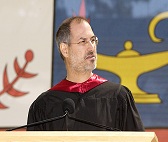 6 years have passed from the day Steve Jobs addressed new graduates of Stanford University during the commencement. It was a moving speech where he gave 3 personal stories that transformed his life.
6 years have passed from the day Steve Jobs addressed new graduates of Stanford University during the commencement. It was a moving speech where he gave 3 personal stories that transformed his life.
The first story was about connecting the dots. He dropped out of college believing that the classes were overrated and overpriced. He wanted to learn what he was interested in not what the school obligated him to take as classes. For over 18 months, he stayed on campus to attend classes that he was interested in as a drop-in. He chose interesting courses such as calligraphy, that would have never crossed his mind if he were aiming for a degree.
He never thought at the time that taking calligraphy would have any practical application in his life. Surprisingly, 10 years later when he was designing Macintosh technology all the basics that he learnt from the calligraphy class came back to him. Macintosh was the first computer with beautiful typography. Without this class, the Mac wouldn’t have multiple typefaces or proportionally spaced fonts. Since this technology was initiated by Apple and later adopted by Microsoft, PCs might not have had these features either. Of course, when he was attending classes as he pleased, Jobs had no idea on how to connect the dots in the future. However, it became very clear how the dots lined up looking back 10 years later. He believed to simply do what he was passionate about and be confident that wherever his heart takes him will lead him to a meaningful goal.
The second story is about love and loss. Jobs was lucky to have found what he liked early in his life. He was only 20 when he started working very hard on designing Macintosh in the garage at his parents with his friend Woz. In a decade, Apple grew from 2 workers to a $2 billion company with over 4000 employees. When he turned 30 Jobs finished the finest creation of a Macintosh. 30 was a controversial year of both success and failure for Jobs. He had finally finished the product he had been working on so meticulously, and he was fired by the new top management of Apple, he was very publicly put out of the company that he had founded! All the great work and effort he had put in vanished suddenly. He didn’t know what to do for a few months… Yet, it dawned on him that the turn of events at Apple didn’t change the love he had for what he was doing. For the next five years, he entered the most creative phase of his life: he built NeXT which was later purchased by Apple in 1996. The software designed by NeXT was used to upgrade the dated Apple Operating System. He established Pixar, the first animated film company, and released the most applauded animated movie Toy Story. Looking back over these years, he concludes that the best thing that happened to him was to get fired from Apple. His lessons from this love and loss story to the new grads are clear: ‘If you follow what you believe and love, the result will be great work. Don’t settle until you find what you love. Keep looking!’
The third story is about death. When he was 17 years old, he heard the saying ‘If you live each day as if it were your last, someday you will most certainly be right.’ Since then, he lived each day as the last day of his life. He asks himself everyday ‘If today is the last day of my life, would I want to do what I am about to do?’ If the answer is no, he knows for sure he needs to change. When he found out that he had a rare pancreatic tumor, he was told that he only had a few months left to live, to say good bye, to straighten his affairs. To Steve Jobs, death had useful and purely intellectual implications. In the face of death he realized once more that life is limited and he has to make most out of it. His operation went well and he successfully battled cancer in the years that followed.
I am sure his philosophy towards death helped him tremendously: He never wasted time living someone else’s life, he followed his dreams and passions. He was not trapped by the other people’s opinions on his success. He listened closely to his own inner voice and blocked all other noise. Even if he felt like a complete failure when he was fired, he had the courage to follow his heart and intuition. It was his heart and intuition that led him to the right direction. Everything else was secondary.
In the end of his speech, he advised all to stay hungry and stay foolish. This has been his personal motto for life.
Hopefully, he will triumph one more time against cancer and get back to Apple to follow his heart and intuitions.
 Ela Erozan Gürsel writes a weekly column named “Değişim Yelpazesi ” on global business trends for Dünya Gazetesi on behalf of Datassist for almost two years. Her feature topics include: green energy; climate change; impacts of financial crisis on companies, sectors and regions; innovative technologies in sciences, human resources and management; social networks transforming business and politics; changing dynamics of marketing and branding.
Ela Erozan Gürsel writes a weekly column named “Değişim Yelpazesi ” on global business trends for Dünya Gazetesi on behalf of Datassist for almost two years. Her feature topics include: green energy; climate change; impacts of financial crisis on companies, sectors and regions; innovative technologies in sciences, human resources and management; social networks transforming business and politics; changing dynamics of marketing and branding.
She also writes articles for international magazines published in Singapore.
Prior to her writing career, she worked at Datassist as a Project Manager in a project that combines human resources and mobile communications with the aim to connect blue-collar workers and employers through mobile phones. Before engaging in this exciting project, she was in pharmaceutical sales working for a multinational company. She graduated from American University, Washington, DC, majoring in International Studies with a concentration on International Business and Europe. She worked in Washington D.C. as an Account Manager at a boutique telemarketing firm that specializes in fund raising and publication renewals. She speaks Turkish, English, French, and Spanish. She currently resides in Singapore with her husband.
 Turkish Labor Law
Turkish Labor Law



